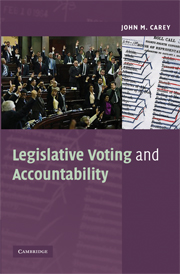Book contents
- Frontmatter
- Contents
- Preface
- 1 TO WHOM ARE LEGISLATORS ACCOUNTABLE?
- 2 COLLECTIVE ACCOUNTABILITY AND ITS DISCONTENTS
- 3 THE SUPPLY OF VISIBLE VOTES
- 4 DEMAND FOR VISIBLE VOTES
- 5 COUNTING VOTES
- 6 EXPLAINING VOTING UNITY
- 7 THE INDIVIDUAL-COLLECTIVE BALANCE
- Appendix: Interview Subjects by Country
- References
- Index
- Titles in the series
1 - TO WHOM ARE LEGISLATORS ACCOUNTABLE?
Published online by Cambridge University Press: 05 June 2012
- Frontmatter
- Contents
- Preface
- 1 TO WHOM ARE LEGISLATORS ACCOUNTABLE?
- 2 COLLECTIVE ACCOUNTABILITY AND ITS DISCONTENTS
- 3 THE SUPPLY OF VISIBLE VOTES
- 4 DEMAND FOR VISIBLE VOTES
- 5 COUNTING VOTES
- 6 EXPLAINING VOTING UNITY
- 7 THE INDIVIDUAL-COLLECTIVE BALANCE
- Appendix: Interview Subjects by Country
- References
- Index
- Titles in the series
Summary
Introduction
Overview
Legislatures are, formally, the principal policymaking institutions in modern democracies. The most fundamental policy decisions – budgets; treaties and trade agreements; economic, environmental, and social regulation; elaboration of individual and collective rights – all must be approved by legislatures. What forces drive legislators' decisions? What different political actors place demands on legislators, and how do legislators' actions reflect these demands?
These are questions about what sort of representation citizens can expect from those they send off to deliberate and make policy decisions on their behalf. Citizens want legislatures to be decisive – that is, to resolve the issues before them without chronic deadlock. They also want accountability, which entails responsiveness on the part of legislators to citizens' demands. In modern democratic legislatures, the principal vehicles for delivering decisiveness are strong political parties. Decisiveness through party discipline, however, presents a dilemma in terms of what kind of accountability is possible.
This book distinguishes between collective accountability and accountability that operates at the level of individual legislators, which often make different demands on legislators. In modern democratic legislatures, collective accountability operates primarily through parties and requires legislators bearing a common party label to act in concert. Individual accountability implies a more direct link between a legislator and citizens and may require the legislator to act independently of party demands. Individual accountability also requires that information about each legislator's actions be available to those outside the legislature and capable of being monitored.
- Type
- Chapter
- Information
- Legislative Voting and Accountability , pp. 1 - 22Publisher: Cambridge University PressPrint publication year: 2008

